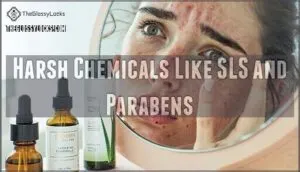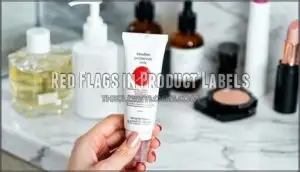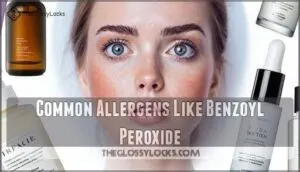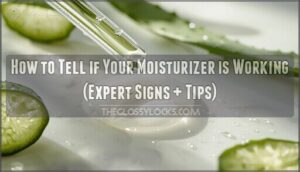This site is supported by our readers. We may earn a commission, at no cost to you, if you purchase through links.

Skip harsh chemicals like SLS in cleansers, benzoyl peroxide in acne treatments, and alcohol-based toners that strip your skin’s natural barrier.
Food-wise, common culprits include gluten, dairy, soy, and certain preservatives that can cause digestive issues or skin flare-ups.
Even some "natural" ingredients like essential oils or botanical extracts can irritate sensitive skin.
Reading labels becomes your superpower when you’re hunting down hidden triggers that might be sabotaging your comfort.
Smart product choices can transform your daily routine from a minefield into smooth sailing.
Table Of Contents
- Key Takeaways
- Sensitive Skin Triggers
- Foods to Avoid
- Skincare Ingredients
- Safe Skincare Choices
- Avoiding Irritants
- Frequently Asked Questions (FAQs)
- Are there Bad Ingredients for sensitive skin?
- Do you know what not to use if you have sensitive skin?
- How do I choose the best skincare for sensitive skin?
- Do sensitive skin products contain fragrance?
- Which skincare products are best for sensitive skin?
- What are the most common irritants in skin care products?
- Which ingredients should I avoid for sensitive skin?
- What can irritate sensitive skin?
- How to know if a product is safe for sensitive skin?
- What are the 4 types of sensitive skin?
- Conclusion
Key Takeaways
- Avoid sulfates, parabens, and artificial fragrances – these strip your skin’s natural barrier and trigger burning, stinging, and redness in sensitive individuals
- Skip harsh skincare actives like benzoyl peroxide and alcohol-based toners – they compromise your skin’s protective barrier and worsen existing sensitivities
- Watch out for dietary triggers, including gluten, dairy, and soy – these common food allergens can cause digestive issues and skin flare-ups from the inside out
- Read labels carefully, since "natural" doesn’t mean safe – essential oils, botanical extracts, and even "unscented" products can contain hidden irritants that cause reactions
Sensitive Skin Triggers
Your skin reacts to products when its protective barrier can’t handle certain ingredients that cause burning, stinging, or redness.
Understanding which common skincare ingredients trigger these reactions helps you make better choices and avoid unnecessary discomfort, by knowing which ingredients to look out for, and thus making better decisions.
Common Irritants in Skincare
Your skin acts like a fortress, but certain ingredients break down its defenses.
Your skin’s fortress crumbles under harsh ingredient attacks.
Sulfates strip natural oils, while parabens disrupt hormones. Fragrance allergens trigger reactions in sensitive people.
Petroleum irritation clogs pores, and ethanol damage weakens your skin barrier. Alpha hydroxy acids can cause burning sensations.
Sodium lauryl sulfate leaves skin dehydrated and irritated. Understanding skin sensitivity issues is essential to avoiding these harmful ingredients and maintaining healthy skin.
Fragrances and Allergens
When fragrances trigger reactions, you’re dealing with one of skincare’s biggest troublemakers.
Synthetic fragrances contain multiple allergens that cause allergic contact dermatitis and scent sensitivity.
Here’s what happens with fragrance reactions:
- Perfume irritation develops from repeated exposure to odor triggers
- Allergen testing reveals hidden sensitivities you didn’t know existed
- Fragrance-free products become your skin’s best friend
Choose unscented options over "fragrance-free" labels—they’re safer for sensitive skin.
Harmful Chemicals in Cosmetics
Beyond fragrances, you’ll find toxic ingredients lurking in many cosmetics that trigger chemical reactions and skin irritants.
Parabens appear in 99% of urine samples, while phthalates disrupt hormones and cause allergic responses.
Choose parabenfree cosmetics, phthalatefree beauty products, fragrancefree skincare, sulfatefree cleansers, and alcoholfree toners to avoid these cosmetic dangers.
Understanding skin irritation treatment is essential to managing sensitive skin effectively.
Foods to Avoid
Your diet can trigger skin sensitivity just as much as what you put on your face.
Common food allergens like soy, gluten, dairy, egg whites, and alcohol often cause reactions ranging from hives to dermatitis flare-ups, including dermatitis.
Soy and Gluten Allergies
If you’re watching out for sensitive skin products, keep an eye on dietary triggers like soy and gluten.
Soy Intolerance and Gluten Reactions can spark skin inflammation or food allergies, even when you least expect it.
These hidden food allergens sneak into everyday items:
- Bread and cereal
- Snack bars
- Meat substitutes
- Sauces and dressings
- Personal care products
Dairy and Egg Allergens
Beyond avoiding obvious irritants, dairy and egg whites can trigger unexpected skin reactions through food sensitivities.
Lactose intolerance doesn’t just affect your stomach—it can cause hives and inflammation.
Egg allergies often manifest as rashes, while dairy products may worsen acne breakouts.
If you notice skin reactions after consuming these foods, consider going dairy free temporarily to identify triggers and manage your food sensitivities effectively.
Wine and Alcohol Sensitivity
That relaxing glass of wine mightn’t be as harmless as you think.
Red Wine Sensitivity affects many people through histamine intolerance, causing skin flushing, itching, and irritation.
Wine contains compounds that trigger Alcohol Reactions, leading to redness and inflammation.
Even moderate Drinking Limits can cause Booze Triggers in those with sensitive skin, making Wine Allergies a hidden culprit behind unexplained skin problems.
Skincare Ingredients
When you’re dealing with sensitive skin, certain skincare ingredients can trigger reactions even if they seem harmless.
Many common products contain harsh chemicals, artificial fragrances, and preservatives that can cause irritation, redness, or burning sensations.
Harsh Chemicals Like SLS and Parabens
Your skin battles toxic ingredients daily through seemingly innocent products.
SLS and parabens lurk in everyday cosmetics, stripping your natural barrier and triggering reactions.
- SLS increases skin permeability by 45%, making irritation more likely
- Parabens cause allergic reactions in up to 8% of sensitive individuals
- Chemical irritants hide in "gentle" cleansers and moisturizers
- SLS alternatives like sodium cocoyl isethionate offer safer cleansing
- Paraben-free cosmetics reduce eczema flares and chronic irritation
Using SLS free products can be a viable solution to minimize skin irritation.
Artificial Fragrances and Dyes
Artificial fragrances rank as the leading skincare allergens, triggering fragrance allergies in countless users.
**Artificial fragrances cause more skin reactions than any other beauty ingredient.
These synthetic dyes and chemical irritants contain phthalate-free beauty concerns that aren’t always disclosed. You’ll find fragrance components lurking in "unscented" products too.
Choose fragrance-free skincare and dye-free sunscreen options. Colorant risks from artificial fragrances create skin reactants that compromise your barrier function completely.
Understanding harmful skincare ingredients is essential for maintaining healthy skin.
Preservatives and Endocrine Disruptors
Hidden dangers lurk in everyday skincare products through chemical preservatives and endocrine disruptors.
Paraben risks include hormone disruption, while phthalate effects target reproductive health. Triclosan dangers involve thyroid interference, and formaldehyde exposure increases cancer risk.
Toluene toxicity affects your immune system. Choose paraben-free cosmetics and phthalate-free beauty products to protect yourself from these harmful preservatives.
Using paraben free products can substantially reduce the risk of hormone disruption and other health issues.
Safe Skincare Choices
Finding skincare that won’t irritate sensitive skin doesn’t have to feel overwhelming.
By choosing gentle ingredients like zinc oxide, niacinamide, and hyaluronic acid, you can build a routine that soothes rather than aggravates your skin, which is the key to a successful skincare regimen with sensitive skin.
Mineral Sunscreens and Zinc Oxide
Unlike chemical sunscreens that absorb into your bloodstream, mineral sunscreen creates a protective shield on your skin’s surface.
Zinc oxide and titanium dioxide provide broadspectrum protection without triggering reactions. These noninflammatory ingredients offer barrier repair benefits while delivering reliable oxide protection.
Mineral sunscreens often utilize mineral active ingredients to enhance their protective effects.
- Zinc Benefits: Your skin gets gentle, effective UV defense without irritation
- Sunscreen Safety: No harmful absorption means peace of mind for daily use
- Mineral Actives: Pure protection that won’t compromise your skin barrier
- Barrier Repair: Healing properties that actually improve sensitive skin over time
- Oxide Protection: Physical blocking power that sensitive skin can finally trust
Niacinamide and Hyaluronic Acid Benefits
Two powerhouse ingredients can transform your sensitive skin routine without causing irritation.
Niacinamide reduces redness and strengthens your skin barrier while providing anti aging benefits through improved skin repair.
Hyaluronic acid delivers a serious moisture boost, making it perfect for sensitive skin products.
Together, these fragrance-free skincare heroes create hypoallergenic makeup-friendly skin that’s healthier and more resilient.
Understanding the skin care benefits is essential for achieving the best results.
Avoiding Irritants
When you’re reading skincare labels, certain ingredients act like red flags that signal potential trouble for sensitive skin.
You’ll want to steer clear of common culprits like benzoyl peroxide, alcohol, and sulfates, plus watch out for seemingly harmless natural ingredients that can still cause irritation.
Red Flags in Product Labels
Reading product labels isn’t always straightforward when toxic ingredients hide behind clever marketing terms.
"Hypoallergenic makeup" and "fragrance-free skincare" claims lack standardized testing, while "dermatologist-tested" doesn’t guarantee safety from parabens or SLS.
Check ingredient lists carefully—"unscented" products may still contain masking agents, and "natural" doesn’t exclude potent allergens that trigger reactions in sensitive skin.
Understanding harmful skincare ingredients is essential for making informed decisions about the products we use, to avoid sensitive skin reactions.
Common Allergens Like Benzoyl Peroxide
Several common skin irritants disguise themselves as helpful acne treatments, but they can backfire on sensitive skin types.
Benzoyl peroxide leads this troublesome group, causing chemical reactions that worsen existing sensitivities.
Common Allergen Triggers to Avoid:
- Benzoyl peroxide – causes dryness, redness, and peeling in sensitive skin
- Glycolic acid – creates irritation and isn’t recommended for highly reactive skin
- Fragranced products – contain stabilizing chemicals that trigger allergic responses
- Parabenfree cosmetics alternatives may still contain methylisothiazolinone, causing burning sensations
- Noncomedogenic lotion with alcohol strips your skin barrier, increasing vulnerability to damage
Natural Ingredients That Can Irritate Skin
Natural ingredients don’t automatically mean skin-safe.
Essential oils like tea tree frequently trigger reactions in sensitive individuals, with studies showing up to 56% relevance in patch tests.
Coconut oil clogs pores, while botanicals contain allergens like limonene.
Even fragrance-free skincare with aloe vera can cause irritation.
Choose paraben-free cosmetics and noncomedogenic lotions carefully, testing for essential oil sensitivity first.
Sensitive skin individuals should avoid products with sensitive skin triggers to prevent irritation.
Frequently Asked Questions (FAQs)
Are there Bad Ingredients for sensitive skin?
Yes, sensitive skin has many ingredient enemies. You’ll want to avoid fragrances, sulfates, alcohol, benzoyl peroxide, glycolic acid, and parabens – they’re notorious for causing burning, stinging, and irritation reactions.
Do you know what not to use if you have sensitive skin?
Like walking through a minefield, managing sensitive skin care requires avoiding harmful ingredients that’ll trigger reactions.
Skip fragrances, sulfates, alcohol, benzoyl peroxide, glycolic acid, parabens, and formaldehyde-releasing preservatives—they’ll irritate your delicate skin barrier, specifically the delicate skin barrier.
How do I choose the best skincare for sensitive skin?
Choose gentle, fragrance-free products with minimal ingredients. Patch test everything on your wrist first. Look for niacinamide, hyaluronic acid, and ceramides. Avoid alcohol, sulfates, and harsh acids completely.
Do sensitive skin products contain fragrance?
Many sensitive skin products unfortunately contain fragrance, which is a leading allergen.
You’ll need to read labels carefully and look for "fragrance-free" options rather than "unscented," since fragrances cause burning and irritation.
Which skincare products are best for sensitive skin?
Seventy percent of people worldwide experience sensitive skin symptoms, making product selection essential.
Choose gentle cleansers with ceramides and niacinamide, mineral sunscreens with zinc oxide, and fragrance-free moisturizers to protect your compromised skin barrier, utilizing fragrance-free products.
What are the most common irritants in skin care products?
Fragrances, alcohol, and sulfates top the list of skincare irritants that’ll make your sensitive skin throw a tantrum.
These ingredients strip your skin’s natural barrier, leaving it vulnerable to redness and irritation.
Which ingredients should I avoid for sensitive skin?
Like walking through a minefield, managing sensitive skin means avoiding fragrances, alcohol, sulfates, parabens, and chemical sunscreens.
You’ll also want to skip glycolic acid, benzoyl peroxide, and formaldehyde-releasing preservatives to prevent irritation.
What can irritate sensitive skin?
Sensitive skin reacts to environmental factors, cosmetics, and ingredients like fragrances, sulfates, alcohol, and preservatives. Stress, hormonal changes, and harsh chemicals can trigger burning, stinging, redness, and irritation reactions.
How to know if a product is safe for sensitive skin?
Like a detective examining evidence, you’ll want to patch test any new product on your wrist for 48 hours before full use.
Check ingredient lists carefully, avoiding known irritants like fragrance, alcohol, and sulfates.
Choose products labeled "sensitive skin" or "hypoallergenic.
What are the 4 types of sensitive skin?
You’ll encounter four main types: naturally sensitive (genetic predisposition), environmentally reactive (weather, pollution triggers), reactive (product-induced irritation), and thin-skinned (physically delicate barrier requiring gentler care).
Conclusion
Remember: knowledge is power, but knowing which products to avoid for sensitivity gives you control over your comfort.
Skip sulfates, parabens, and artificial fragrances in skincare routines.
Dodge gluten, dairy, and soy if they trigger reactions.
Even natural ingredients like essential oils can cause irritation.
Check labels carefully for hidden allergens and harsh chemicals.
Your skin will thank you for choosing gentler alternatives that support rather than sabotage your daily wellness routine, giving you control over your comfort.
- https://pmc.ncbi.nlm.nih.gov/articles/PMC6234074/
- https://www.houstonmethodist.org/blog/articles/2022/feb/sensitive-skin-symptoms-common-triggers-how-its-treated/
- https://www.laroche-posay.me/en/article/skin-allergy-sensitive-skin-and-reactive-skin
- https://community.the-hospitalist.org/content/whiff-trouble-navigating-allergic-contact-dermatitis-fragrance
- https://linnebotanicals.com/blogs/blog/hidden-hormone-disruptors-in-skincare











